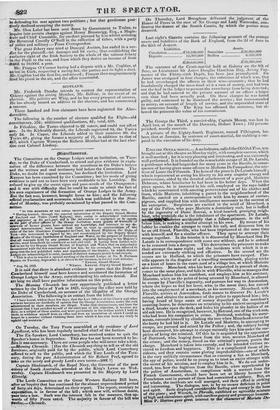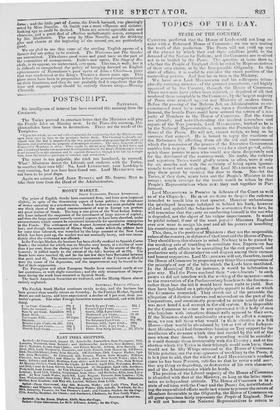ENGLISH OPERA -110USE.—A melodrama, called the Old Oak Tree, was
brought out at this theatre on Monday night, with complete success, which it well merited ; for it is very pleasing and interesting, and was extremely well performed. It is founded on the remarkable escape of M. De Latude, a gentleman who had languished for many years in the Bastile, in conse- quence of having given some offence to Madame De Pompadour, t he mis- tress of Louis theFifteenth. The hero of the piece is DeLatude himself ; who is represented as owing his liberty to his own singular energy and perseverance, aided by the devoted attachment of a poor girl, Marlette Delorme, whose benefactor he had been in his better days. When the piece opens, he is immured in his cell, employed on the rope-ladder which he constructed with amazing perseverance out of his clothes and linen, while Mariette, inhabiting a garret in the neighbourhood of the Bastile, carried on a correspondence with him by means of carrier- pigeons, and supplied him with intelligence necessary to the success of his enterprise. Suspicions are excited in the mind of Mouchard, a spy of the Police, who pays Mariette a domicilary visit, but is battled by the ingenuity of Dame Bonval, a kind-hearted, gossiping neigh. bour, wh ' retends she is the inhabitant of the apartment. De Latude, lato ll Vera accidentally that a fellow-prisoner, in the cell below urn, is making a similar attempt to his own. By means of his ladder he enables the stranger to reach his- cell, and discovers him to be an old friend, Florville, who had been imprisoned at the same time with himself, and for a similar offence. They agree to attempt their escape together. In the interim it is discovered by Mouchard that De Latude is in correspondence with some one without, and he is ordered to be removed into a dungeon. This determines the prisoners to make their attempt the same night ; and the incidents with which it is at- tended are extremely striking and effective. In the second act the scenes are in Holland, to which the prisoners have escaped. Flor- ville appears in the disguise of a travelling mountebank, playing tricks on a knot of boors in the court-yard of a village inn, at which Mariette also arrives. Mouchard, who has been despatched in pursuit of them, comes to the same place, and falls in with Florville, who so manages that Mouchard bakes him his confidant, arid employs him as his assistant. Mariette, when on the point of being arrested by Mouchard, is allowed to escape by Florville's ingenuity, and pursues her way to Amsterdam, where she hopes to find her lover, who, in the mean time, has entered into the employment of a merchant, as his secretary. Mouchard, with Florville, arrives at Amsterdam, finds means to discover De Latude's retreat, and obtains the assistance of the police to apprehend him ; but, having heard of large sums of money. deposited in the merelmat's counting-house, be determines on returning to his ancient occupation of a thief, breaks open the desk, and hides his plunder in the hollow of an old oak tree. He is recognized, however, byBetrand, one of the workmen, who had been his companion in crime. Bertrand, watching his move- ments, conceals himself by climbing the tree when Mouchard returns for the booty be had hid in it. De Latude and Mariette, in attempting to escape, are pursued and seized by the Police ; and, the robbery having been discovered, his attempt to escape naturally lays him under the sus- picion of being the criminal. Of this he is acquitted by the appearance of Bertrand, who, leaping down from the tree, accuses Mouchard of the crime; and the money, found on the criminal's person, proves the charge. Mouchard is taken into custody, and his intended victims re- stored to freedom and happiness. This is a complicated tissue of in- cidents, and they contain some glaring improbabilities—one of which is the very unlikely circumstance that so cunning a fox as Mouchard, the spy of police, would be so young as to trust an entire stranger with the secret of his mission, and to employ him in it. We do not under- stand, too, how the fugitives from the Bastile, when apprehended by the police of Amsterdam, in compliance with a warrant from the French Government, should have been set at liberty because the Frenchman sent in pursuit of them had committed a robbery. But, on the whole, the incidents are well managed, and their effect is striking and interesting. The dialogue, too, is by no means deficient in point and spirit. Serie displayed considerable feeling and energy in the hero of the piece and Wrench, in Florville, exhibited an agreeable mixture of high and chivalrous spirit, with careless gayety and grotesque humour. Mee P. Horton gave great interest to the character of Marlette De- larvae ; and the little pact of Louise, the Dutch barmaid, was pleasingly acted by Miss Novello. 0. Smith was a most villanous and sinister- looking spy as could he desired. There are several agreeable airs and choruses, and a great deal of effective melodramatic music, composed by Mr. Macfarren. The song by Miss Novello, and the drinking glee and chorus at the beginning of the second net, are particularly
good.
We are glad to see that some of the sterling English operas of a former day are going to he revived. The Waterman and The Quaker are announced. This shows good sense and good taste on the part of the committee of management. Palfe's new opera, The Siege of Ro- chelle, is to appear, we understand, very soon. This too, is well; but it is difficult to comprehend the 'policy of bringing forward an English eijecciamento of Klercadante's poor opera of Elise c Claudio—a piece that was condemned at the King's Theatre a dozen years ago. This piece must have been in preparation before the present managers entered on their functions, and they do not probably find it expedient that the time and expense spent should be entirely thrown away.-3forniny Chronicle.



























 Previous page
Previous page